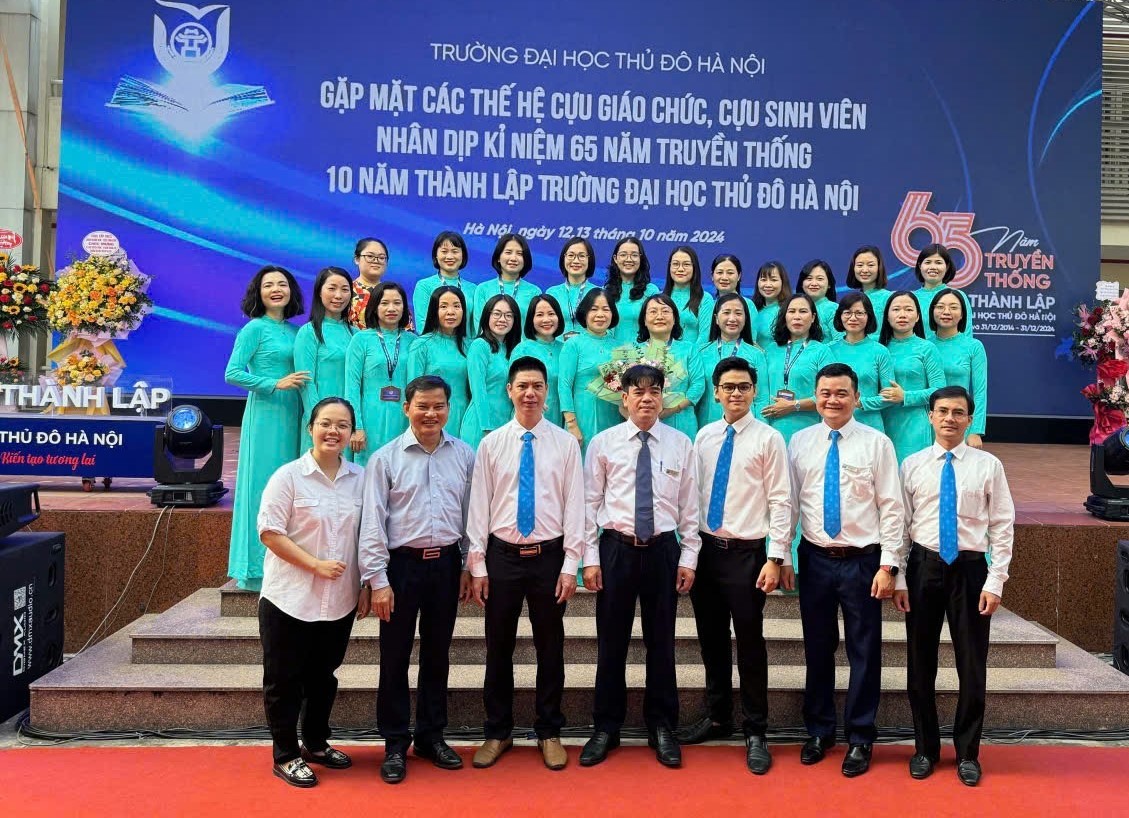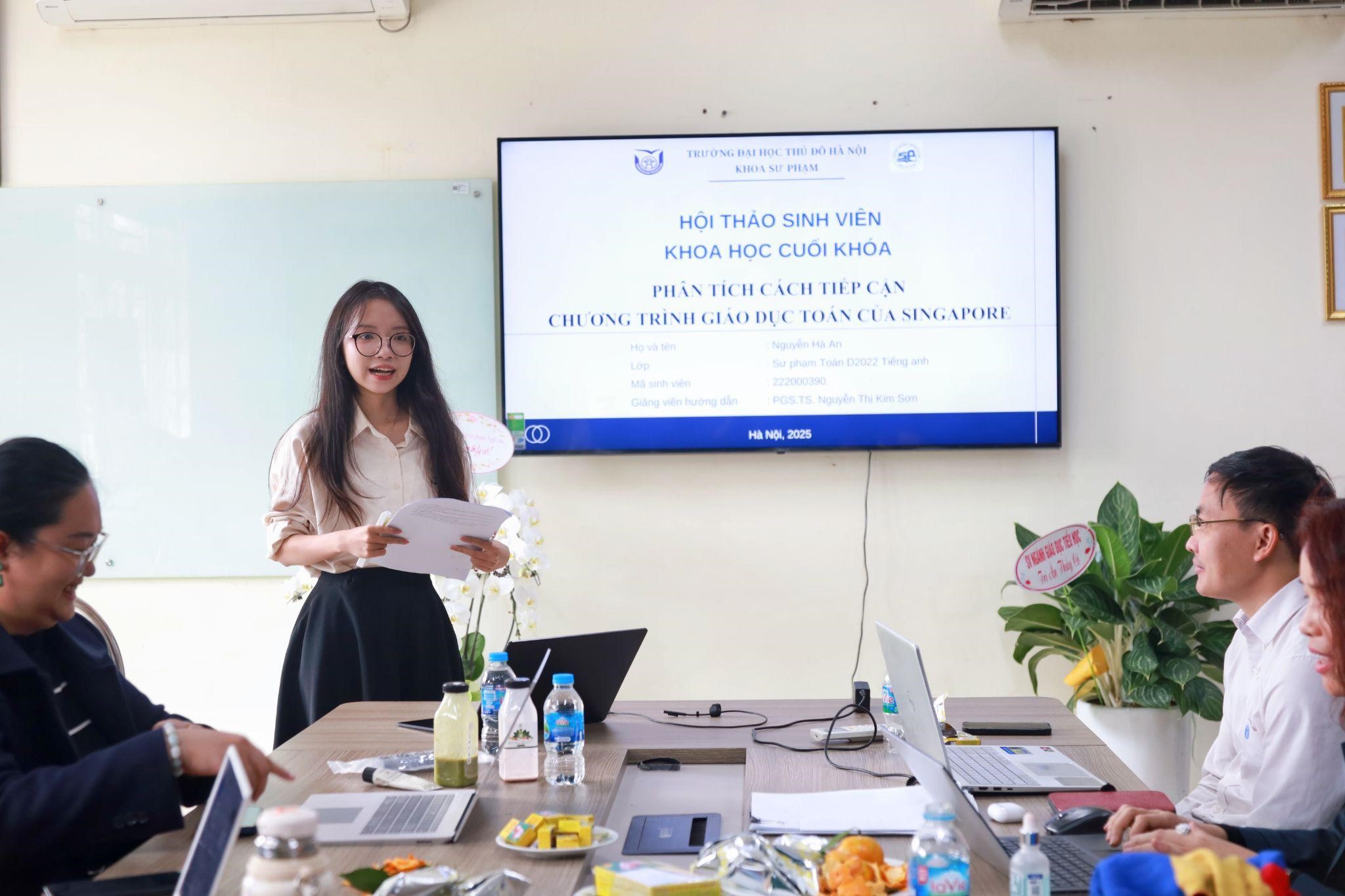Introduction to the Faculty of Social Sciences and Humanities

1. Contact Information
Faculty Office: Floor 1, House H3, Campus 1 (98 Dương Quảng Hàm Street, Quan Hoa Ward, Cầu Giấy District, Hanoi City).
Phone: 0243 834 1864.
Email: khxh@daihocthudo.edu.vn
Head of Faculty: Assoc. Prof. Dr. Vũ Công Hảo
FACULTY OF SOCIAL SCIENCES AND HUMANITIES TEAM | |||
 PGS. TS. Vũ Công Hảo Head of Department |  TS. Nguyễn Ngọc Lan Deputy Head of Department |  TS. Nguyễn Thị Yến Thoa Deputy Head of Department | |
| Political Science | |||
| TS. Dương Thị Nhẫn Program Director | ||
| PhD in Educational Management | |||
|
PGS.TS. Nguyễn Văn Tuân Program Director |
TS. Vũ Thị Quỳnh Deputy Program Director | |
| Master's in Educational Management | |||
 PGS.TS. Nguyễn Xuân Hải Program Director |
ThS. Nguyễn Thị Quỳnh Deputy Program Director | ||
| Bachelor's in Educational Management | |||
 TS. Nguyễn Thị Yến Thoa Program Director |
ThS. Đỗ Thị Thu Hằng Deputy Program Director | ||
| Psychology | |||
 TS. Bùi Hồng Minh Program Director | |||
| Literature | |||
 TS. Nguyễn Thu Nga Program Director | |||
| Law | |||
ThS. Trần Thị Lệ Hằng Deputy Program Director |
TS. Nguyễn Ngọc Lan Program Director | ||
| Social Work | |||
 TS. Phạm Thị Huyền Trang Program Director | |||
| Early Intervention and Counseling Center | |||
 ThS. Vũ Thanh Nga Director | |||
| Faculty Office | |||
 CN. Hồ Thị Thành Academic Secretary |
CN. Nguyễn Thuỳ Dương Academic Secretary | ||
2. Functions and Duties
Recruitment Work
Develop the annual postgraduate admission plan.
Implement communication, counseling, and organize postgraduate recruitment activities.
Training Management Work
Lead the development of management documents, regulations, and rules for postgraduate education.
Lead the management and development of postgraduate training programs.
Organize and manage postgraduate education, including training programs and study periods; planning and organizing teaching; monitoring learning outcomes; conducting inspections and supervision of training activities; handling other activities (temporary leave, dropout, program transfer, relocation to another training facility, study mode change; student exchanges and cooperation in training; dealing with violations by students). Organize the examination boards for proposals, theses, and dissertations.
Manage the training program and study periods for additional training formats as required. Design and implement other training models as directed by the Rector.
Coordinate with faculties and the Training Management & Student Affairs Office in managing teaching loads of lecturers and other related teaching activities.
Student Management Work
Develop and manage student records, manage comprehensive data on students. Ensure implementation of policies and procedures for students; handle procedures for student graduation, dropout, school transfer, and program changes.
Organize the monitoring and evaluation of student activities, thesis works, and other educational activities at the university.
Organize support activities for students in various areas, including proposing improvements to the school’s facilities for student learning, entertainment, and social activities.
Build communication networks with students across all cohorts; collaborate with relevant units to survey students, alumni, and employers; work with relevant departments to analyze feedback from students regarding the training program, teaching staff, and make adjustments to improve the training curriculum.
3. Introduction to the Faculty's History
The Faculty of Social Sciences and Humanities was established by Decision No. 921/QĐ-ĐHTĐHN dated August 21, 2019, by the Rector of Hanoi Metropolitan University, through the merger of the former faculties: Social Sciences, Political Education, Psychology-Education, and the Law Department from the Faculty of Economics and Urban Studies.
Currently, the faculty includes 6 majors (Language and Literature; Political Theory; Psychology; Social Work; Educational Management; Law) and one center (School Counseling and Early Intervention Center).
Regarding the faculty team, the Faculty of Social Sciences and Humanities has 48 staff members, including 3 Associate Professors, 18 Doctors, 26 Masters, and 1 Bachelor (currently studying for a Master's degree). There are currently 11 doctoral students, and 3 are preparing for their defenses.
After the establishment decision, the faculty has followed the guidelines in Document No. 1258/HD-ĐHTĐHN dated October 28, 2019, from the Rector of Hanoi Metropolitan University on "Organizing and staffing the affiliated faculties of Hanoi Metropolitan University." The faculty has set up the Faculty Council and strengthened leadership in the departments and centers.
4. Programs Currently Recruiting and Training
Educational Management Major: Provides general knowledge about the global and Vietnamese educational systems, specialized knowledge, and skills in educational management; helps students understand how to organize, manage, inspect, and evaluate educational activities at macro and micro levels, thus enhancing educational development and meeting the demands for comprehensive reform. Upon graduation, students can become education experts, managers, lecturers, and specialists at educational institutions. The Educational Management program has been enrolling and training master's level courses for the years 2018-2020, 2019-2021, and 2020-2022, and has developed and received approval from the Ministry of Education and Training to offer a doctoral program.
Social Work Major: Provides knowledge about Sociology in general, Sociology in cultural and educational management specifically; equips students with the skills to organize and manage cultural-social activities; public speaking skills, mobilizing the masses; organizing activities for social movements… contributing to maintaining discipline, reducing social evils, and fostering societal progress. After graduation, students can work in cultural offices, labor-social welfare departments; as consultants in health facilities, schools, and as social workers or lecturers at educational institutions.
Special Education Major: Provides knowledge in Psychology, Education, and specialized knowledge in Special Education. Students are trained to identify and apply knowledge, skills, and methods to educate special groups, including those with social diseases or congenital disabilities, requiring support and intervention. During their studies, students have the opportunity to learn from experts and practice at educational facilities and the School Counseling and Early Intervention Center of the university. After graduation, students can work at medical institutions, inclusive education centers, counseling centers, primary and kindergarten schools, or as specialists and lecturers in universities and colleges. The demand for human resources in the Special Education sector is very high. Students in this program are fully exempt from tuition fees for the entire course.
Law Major: Provides fundamental knowledge of the law curriculum, helping students understand the legal system of the state; the organization of the legislative, judicial, and executive branches and the activities of law enforcement agencies. During their studies, law students have the opportunity to practice at the university’s Law Consultation and Practice Center, experiencing practical skills through consultations and legal proceedings at local levels. After graduation, students can work in judicial and executive agencies at both central and local levels; in businesses, organizations, and schools as legal officers; as lawyers, notaries, or independent legal consultants, or teaching law in educational institutions.
Political Science Major: Provides a basic understanding of political and social knowledge, helping students understand both domestic and international political situations; internalize Marxism-Leninism and Hồ Chí Minh Thought, develop political awareness, independent and creative thinking, presentation, and commentary skills; acquire political confidence, professionalism, and good citizenship ethics… After graduation, Political Science students can work in organizations and political bodies, serve as lecturers or teachers at schools, reporters, editors, or political commentators at newspapers and media outlets. Political Science students are exempt from tuition fees for the entire course.
Literature Major: (Under update)











